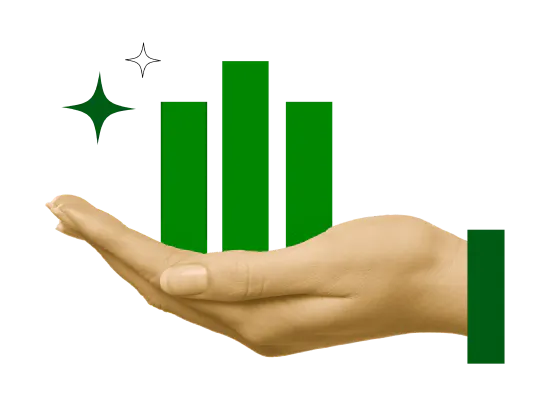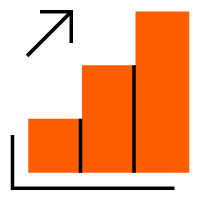Average overall debt
This report provides a picture of average American debt through nearly 99.5 million Credit Karma members with a combined overall debt of more than $9.9 trillion.
Overall debt is defined as any type of debt noted on a Credit Karma member’s credit report. This includes credit card, mortgage, student loan, medical loan, auto lease and auto loan debt.
Average total debt overall continued to rise throughout 2025, but the pace of growth slowed in Q4
In the fourth quarter of 2025, average total overall debt among Credit Karma members increased to $58,712 from $55,879 in the fourth quarter of 2024, a 5% year-over-year gain.
That’s almost the same as 2024’s year-over-year average debt gains (4.9%) — however, in the last quarter of 2025, quarter-over-quarter average debt growth decelerated to just 0.53%. Data in the spring will reveal whether this is just a blip or a stronger signal of changing winds.
Gen Z continues to see the fastest-growing average debt
Generation Z still leads the way in debt growth among generations, with the highest YoY increase in average overall debt in Q4 2025 (15.29%). That’s almost double the debt growth of millennials (8.36%), which had the second-fastest growing debt average. Gen Z’s trajectory is even more eye-popping when their average debt in Q4 2023 ($19,441) is compared to that of Q4 2025 ($25,062): an increase of 28.91%.
Gen Z led all generations in year-over-year growth of average debt (Q4 2024 vs. Q4 2025) across all debt categories, but had the most significant gains in…
- Education: +13.55%
- Mortgage: +7.12%:
- Credit cards: +5.79%
Gen Z debt growth saw its biggest quarter-over-quarter jump in the Q3 of 2025 — then in the last quarter had its lowest quarter-over-quarter gain (2.87%) in at least a couple years.
Average student loan debt continued to rise, but the pace tempered
Student loan debt grew 7.59%, the most of all debt categories year over year (Q4 2025 versus Q4 2024), driven largely by Gen Z and millennials (13.55% and 9.06%, respectively) — though Baby Boomers still held the highest average student loan debt in Q4 2025 ($48,965).
Notably, after a 3.39% quarter-over-quarter increase in Q1 2025, student loan debt overall slowed, with quarter-over-quarter increases the rest of the year averaging just 1.34%.
Decline in average inquiries and a rise in average open collections signal financial stress for younger generations
Pressures from debt growth and general economic uncertainty are likely causing Credit Karma members to pump the brakes when it comes to taking on more debt. In the last quarter of 2024, average inquiries across generations was 3.14. In the last quarter of 2025, the average dipped to 2.95.
This hesitance to apply for news credit like cards and loans may be due to increased financial hardship, particularly among younger members. Gen Z and millennials saw the biggest year-over-year drops in average credit inquiries in Q4 — along with some of the bigger increases in average open collections:
- Gen Z inquiries -6.21%, collections +4.88%
- Millennial inquiries -6.88%, collections +5.28%
Average overall debt among Credit Karma members by generation
| Generation | Average of total debt Oct.-Dec. 2024 | Average of total debt Oct.-Dec. 2025 | YoY change in debt |
|---|---|---|---|
| Generation Z | $21,739 | $25,062 | 15.29% |
| Millennial | $59,910 | $64,918 | 8.36% |
| Generation X | $68,280 | $70,710 | 3.56% |
| Baby boomers | $55,469 | $56,526 | 1.91% |
| Silent | $43,176 | $43,918 | 1.72% |
Gen Z’s YoY average debt growth was 15.29%, the highest of all generations.
Still, Generation X continues to hold the highest average amount of debt — nearly three times that of Gen Z at $70,710 in the last quarter of 2025.
Average debt among Credit Karma members by credit score band
| Credit score band | Average total debt Oct.-Dec. 2024 | Average total debt Oct.-Dec. 2025 | YoY change in debt |
|---|---|---|---|
| Subprime (300–600) | $36,898 | $37,919 | 2.77% |
| Near prime (601–660) | $45,034 | $48,671 | 8.08% |
| Prime (661–780) | $61,835 | $65,751 | 6.33% |
| Super prime (781–850) | $78,402 | $81,367 | 3.78% |
The highest credit score bands may have seen greater YoY growth in average debt because people with higher credit scores have greater access to credit on better terms. But in the last quarter of 2025 near prime members had the greatest increase in average debt year over year (8.08%).
Average credit card debt
In the last quarter of 2025, approximately 94.3 million Credit Karma members with at least one credit card held a total of approximately $589 billion in credit card debt, an increase of about 9.7% year over year.
Among generations, year-over-year gains in average credit card debt were most striking for the youngest generations (Gen Z at 5.79%, followed by millennials at 2.64%). In contrast, the oldest generations showed relatively flat or decreases in YoY average card debt.
Average credit card debt among Credit Karma members by generation
| Generation | Average credit card debt Oct.-Dec. 2024 | Average credit card debt Oct.-Dec. 2025 | YoY percent change in credit card debt |
|---|---|---|---|
| Generation Z | $3,764 | $3,982 | 5.79% |
| Millennial | $7,692 | $7,895 | 2.64% |
| Generation X | $10,221 | $10,354 | 1.30% |
| Baby boomers | $8,328 | $8,300 | -0.34% |
| Silent | $5,710 | $5,531 | -3.13% |
Gen X continued to have the highest average credit card debt ($10,354 in the last quarter of 2025).
Average credit card debt among Credit Karma members by credit score band
| Credit score band | Average credit card debt Oct.-Dec. 2024 | Average credit card debt Oct.-Dec. 2025 | Q4 2025 vs. Q4 2024 percent change in credit card debt |
|---|---|---|---|
| Subprime (300–600) | $7,760 | $7,462 | -3.84% |
| Near prime (601–660) | $11,389 | $11,643 | 2.23% |
| Prime (661–780) | $8,137 | $8,529 | 4.82% |
| Super prime (781–850) | $3,736 | $3,836 | 2.68% |
Average card debt grew the most year over year among members in the prime score band, while subprime members were the only group with a decrease.
Near prime members continued to have the highest average card balances in Q4 2025.
Average auto loan debt
In the last quarter of 2025, approximately 66.9 million Credit Karma members with at least one auto loan open held more than $1.17 trillion in loan debt. The average next payment was $673.
The average auto loan balance among members in Q4 was $25,806 — a modest 1.63% increase year over year.
Average auto loan debt among Credit Karma members by generation
| Generation | Average auto loan debt Oct.-Dec. 2024 | Average auto loan debt Oct.-Dec. 2025 | YoY percent change in auto loan debt |
|---|---|---|---|
| Generation Z | $21,323 | $21,871 | 2.57% |
| Millennial | $25,521 | $26,124 | 2.36% |
| Generation X | $28,276 | $28,606 | 1.17% |
| Baby boomers | $23,566 | $23,997 | 1.83% |
| Silent | $19,204 | $19,645 | 2.30% |
Average auto loan debt among Credit Karma members by credit score band
| Credit score band | Average auto loan debt Oct.-Dec. 2024 | Average auto loan debt Oct.-Dec. 2025 | Q4 2025 vs. Q4 2024 percent change in auto loan debt |
|---|---|---|---|
| Subprime (300–600) | $23,994 | $24,222 | 0.95% |
| Near prime (601–660) | $25,843 | $26,430 | 2.27% |
| Prime (661–780) | $26,783 | $27,385 | 2.25% |
| Super prime (781–850) | $23,604 | $24,128 | 2.22% |
Average mortgage debt
From October through December 2025, approximately 36.7 million Credit Karma members with at least one mortgage held a total of more than $7.4 trillion in mortgage debt. The average next payment was $2,185.
The average mortgage balance among members was up slightly year over year in Q4 at $272,382, a 3.57% increase from $262,997.
Average mortgage debt among Credit Karma members by generation
| Generation | Average mortgage debt Oct.-Dec. 2024 | Average mortgage debt Oct.-Dec. 2025 | YoY percent change in mortgage debt |
|---|---|---|---|
| Generation Z | $239,242 | $256,265 | 7.12% |
| Millennial | $298,617 | $311,526 | 4.32% |
| Generation X | $260,485 | $266,309 | 2.24% |
| Baby boomers | $198,425 | $201,663 | 1.63% |
| Silent | $173,700 | $176,324 | 1.51% |
In a continuing trend from last year, millennials and Gen Z led the way in average mortgage debt gains year over year.
Average mortgage debt among Credit Karma members by credit score band
| Credit score band | Average mortgage debt Oct.-Dec. 2024 | Average mortgage debt Oct.-Dec. 2025 | YoY percent change in mortgage debt |
|---|---|---|---|
| Subprime (300–600) | $224,720 | $234,001 | 4.13% |
| Near prime (601–660) | $240,212 | $248,797 | 3.57% |
| Prime (661–780) | $278,461 | $289,416 | 3.93% |
| Super prime (781–850) | $269,536 | $278,892 | 3.47% |
Average mortgage debt increased the most year over year among members in the lowest credit score band.
Average student loan debt
In the last quarter of 2025, approximately 32.4 million Credit Karma members with at least one student loan open held a total of more than $801 billion across 84.5 million student loans.
The average next payment was $123. The average student loan balance among members in the last quarter of 2025 was $34,072 — up 7.59% compared to the fourth quarter of 2024, when average student loan debt was $31,667. This marks the largest YoY increase in average debt across the debt categories, driven in large part by Gen Z (up 13.55% YoY).
Average student loan debt among Credit Karma members by generation
| Generation | Average student loan debt Oct.-Dec. 2024 | Average student loan debt Oct.-Dec. 2025 | Q2 2025 vs. Q4 2024 percent change in student loan debt |
|---|---|---|---|
| Generation Z | $17,470 | $19,837 | 13.55% |
| Millennial | $31,575 | $34,435 | 9.06% |
| Generation X | $43,451 | $46,959 | 8.07% |
| Baby boomers | $45,980 | $48,965 | 6.49% |
| Silent | $37,685 | $39,726 | 5.42% |
Average student loan debt among Credit Karma members by credit score band
| Credit score band | Average student loan debt Oct.-Dec. 2024 | Average student loan debt Oct.-Dec. 2025 | YoY percent change in student loan debt |
|---|---|---|---|
| Subprime (300–600) | $29,616 | $30,099 | 1.63% |
| Near prime (601–660) | $30,063 | $35,768 | 18.98% |
| Prime (661–780) | $33,377 | $37,077 | 11.09% |
| Super prime (781–850) | $35,640 | $35,631 | -0.03% |
If you want help with your student loans, Credit Karma’s student loan resource page can walk you through a simple, step-by-step process to check your loan status, learn about options for relief and find answers to common student loan questions.
Average credit scores among Credit Karma members with debt
The average VantageScore 3.0 credit score for Credit Karma members with debt dropped year over year, from 676 in the last quarter of to 673 in the last quarter of 2025.
While Baby Boomers and the Silent generation had minor dips year over year, the decline in average credit scores for the youngest generations was more significant — with Gen Z dropping eight points to 659, and millennials dropping four points to t 665 in Q4 2025.
Average VantageScore 3.0 score among Credit Karma members with debt by generation
| Generation | Average VantageScore 3.0 Oct.-Dec. 2024 | Average VantageScore 3.0 Oct.-Dec. 2025 |
|---|---|---|
| Generation Z | 659 | 651 |
| Millennial | 669 | 665 |
| Generation X | 673 | 672 |
| Baby boomers | 715 | 714 |
| Silent | 737 | 735 |
Accounts in collections
For this report, accounts in collections are any credit card, mortgage, student loan, medical loan, auto lease or auto loan accounts that have been sent to collections agencies, according to their credit reports. Creditors may have different standards for when they transfer debt to collections, but the typical cutoff is 120 to 150 days past due. For this report, we’re able to determine if an account is in collections but not how many days past due it is.
Among Credit Karma members with accounts in collections, the average number of open accounts (among those with collections on their credit reports) in the last quarter of 2025 was 2.5 — a slight lift year over year from 2.4 in the fourth quarter of 2024.
Keep in mind that this measure only looks at members who have open accounts in collections, not the Credit Karma member population as a whole. That means that it only captures people who are already potentially struggling with their finances.
Average number of accounts in collections among Credit Karma members by generation
| Generation | Average number of accounts in collections for Credit Karma members Oct.-Dec. 2024 | Average number of accounts in collections for Credit Karma members Oct.-Dec. 2025 |
|---|---|---|
| Generation Z | 1.9 | 2.0 |
| Millennial | 2.4 | 2.5 |
| Generation X | 2.6 | 2.7 |
| Baby boomers | 2.3 | 2.4 |
| Silent | 1.9 | 2.0 |
Average number of accounts in collections by VantageScore 3.0 credit score band
| Credit score band | Average number of accounts in collections for Credit Karma members Oct.-Dec. 2024 | Average number of accounts in collections for Credit Karma members Oct.-Dec. 2025 |
|---|---|---|
| Subprime (300–600) | 2.9 | 2.9 |
| Near prime (601–660) | 2.2 | 2.2 |
| Prime (661–780) | 1.3 | 1.3 |
| Super prime (781–850) | 0.9 | 0.9 |
Average credit inquiries
For this report, credit inquiries are applications for new credit, such as credit cards or loans.
In Q4 2025 compared to Q4 2025, inquiries fell across all generations and scorebands (except for super prime, which had no change) — continuing a year-plus downward trend. This likely reflects a pullback on credit applications given signs of increasing stress, including rising debt and an uptick in collections along with persistent macroeconomic uncertainties (tariffs and interest rates, for example).
Subprime and near prime members had the biggest decreases in inquiries among score bands in 2025.
Average number of credit inquiries by Credit Karma members by generation
| Generation | Average number of inquiries for Credit Karma members Oct.-Dec. 2024 | Average number of inquiries for Credit Karma members Oct.-Dec. 2025 |
|---|---|---|
| Generation Z | 2.9 | 2.7 |
| Millennial | 3.2 | 3.0 |
| Generation X | 3.5 | 3.3 |
| Baby boomers | 3.3 | 3.1 |
| Silent | 2.8 | 2.6 |
Average number of credit inquiries by Credit Karma members by VantageScore 3.0 credit score band
| Credit score band | Average number of inquiries for Credit Karma members Oct.-Dec. 2024 | Average number of inquiries for Credit Karma members Oct.-Dec. 2025 |
|---|---|---|
| Subprime (300–600) | 4.8 | 4.3 |
| Near prime (601–660) | 3.8 | 3.5 |
| Prime (661–780) | 2.8 | 2.7 |
| Super prime (781–850) | 1.9 | 1.9 |
Methodology
This report drew on insights from the aggregated reports of roughly 99.5 million Credit Karma users. All aggregate data analyzed was pulled on Jan. 5, 2026, and came from members’ TransUnion credit reports. Averages were based on information from the previous 90 days.









